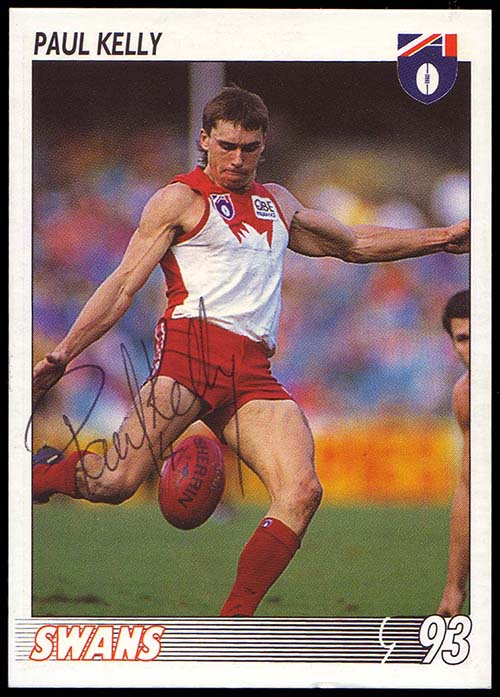Paul Kelly
Category: Sporting Hall of Fame
Sport: Australian Rules football
Year Inducted: 1996

"[Kelly's] achievements are only matched by the humility with which he carried himself through his glittering career and the honesty with which he played to inspire those around him." The Daily Telegraph, 20 July 2007
Paul was born in West Wyalong on 28 July 1969. While still a child, Paul and his family moved to Wagga Wagga, where Paul attended St. Michael's High School and played rugby league with the Wagga Brothers Juniors. At fifteen, he switched from league to Australian Rules, playing for the Wagga Tigers. He quickly graduated to senior ranks and in 1989, won the club's Best and Fairest Award.
In 1990 Paul began a plumbing apprenticeship through Wagga Wagga TAFE, but this was put on hold when the Sydney Swans recruited him from the Wagga Tigers.
He rapidly developed into one of the club's most important players. Having played a considerable amount of rugby during his formative years he excelled in attributes shared with that code such as tackling, obtaining the ball under duress, and evading opposition players whilst running with it.
Paul's courage, skill and consistency were recognised many times as the Swans awarded him their Best and Fairest Award on four occasions between 1992 and 1997. He was named Captain of the Swans in 1993, and he held that position until his retirement nine years later, becoming the longest-serving club captain.
In 1995 Paul passed his 100th game mark for the Swans, and won the Brownlow Medal, which is awarded to the 'fairest and best' player in the Australian Football League during the home-and-away season. The Brownlow winner is determined by votes cast by the officiating field umpires after each game. It is the most prestigious award for individual players in the AFL, and is widely acknowledged as the highest individual honour in the sport of Australian Rules football.
Paul was selected in the 1995, 1996 and 1997 AFL All-Australian teams, being named Captain in the last two of those years. He was as good as it gets in terms of mid-fielders. He won the AFL Players' Association's 'most courageous player' over four successive years, and it was during this time he earned the nickname 'Captain Courageous'. This courage on the field, however, was partially responsible for curtailing his career. Over the course of his time with the Swans, Paul had to undergo more than twenty operations to address injuries sustained on the field.
Courage was certainly one of Paul's most inspiring character traits. Another great talent was his ability to grab the ball and accelerate down the field. His explosive pace over the first five metres, a strong mark and fierce tackling made him an invaluable player and a constant inspiration to his teammates.
The game of Australian Rules gave Paul every accolade, except for a Premiership win. He came close in 1996 when he, and fellow Sporting Hall of Fame inductee Wayne Carey, faced off in that year's AFL Grand Final.
Introduced in 2001, the Paul Kelly Cup is the largest AFL primary school competition in NSW and the ACT, and is open to students in Years 5 and 6.
Paul played 234 games for the Swans between 1990 and 2002, and retired at the end of the 2002 season. His famous number 14 jersey was also retired (for five years).
Paul served as the Swans runner in 2003 and was subsequently inducted into the Swans Hall of Fame, also being named vice-captain of the Swans 'Team of the Century'.
In 2003 Paul published his autobiography 'Swan Song: The Paul Kelly Story', and in October of that year, moved from the city down to his farm in Wagga Wagga. Paul said at the time 'I always thought it was a good place to bring my kids up. I always enjoyed the country life, the farming and getting down the river, fishing and lobstering, we're very happy.'
In 2007 Paul was inducted into the AFL Hall of Fame.
In 2010 Paul was employed by Team GWS (Greater Western Sydney) Giants to help find and develop talented players from his home region. He quit the role twelve months later, as when the Giants entered competition, their main rivals would be the Swans. Seeing himself as a Swan, Paul felt that he couldn't support the Giants against his former club.
In August 2014, Paul's eldest son Jackson, made his debut for the Swans reserves at the Sydney Cricket Ground. In 2015 he was named in the NSW/ACT RAMS side for games two and three of the U18 National Championships. Having shown some promising form, Jack has dreams of following in his father's footsteps.
Today, in 2016, Paul lives with his family on their property on the banks of the Murrumbidgee River, where he farms sheep, cattle and crops.